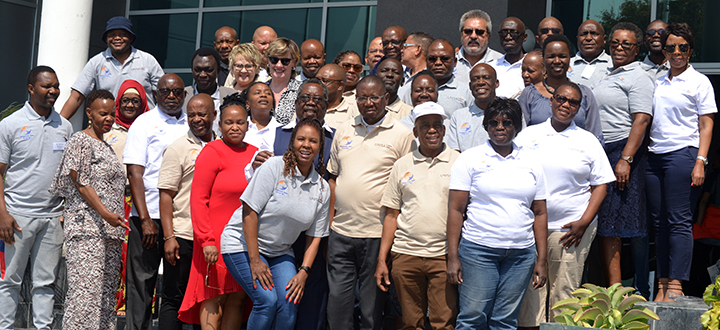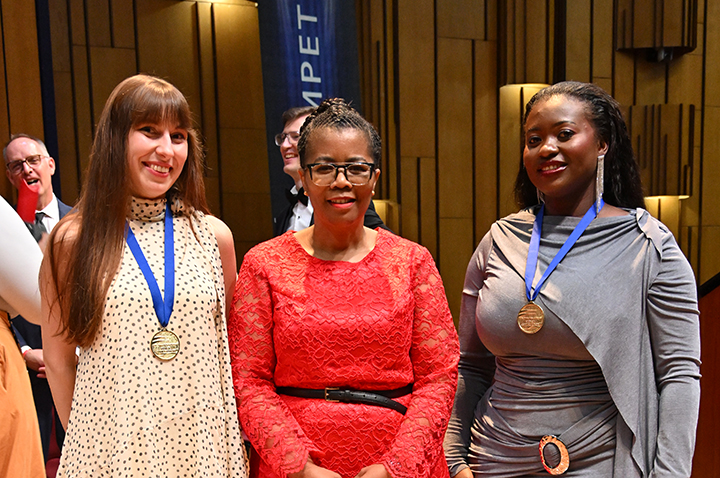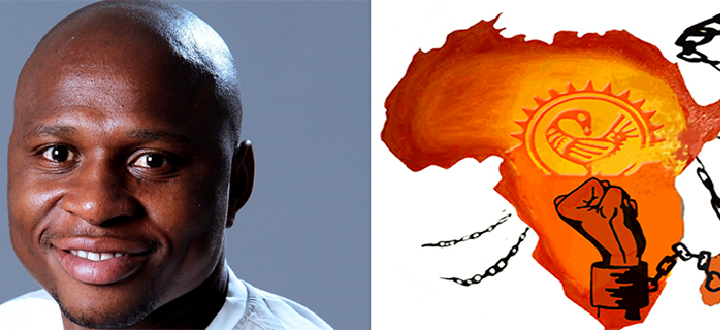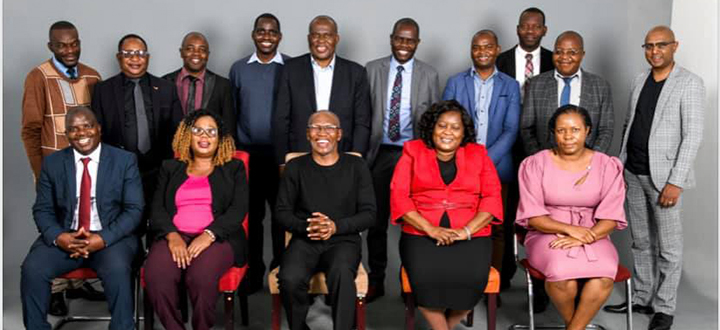

Front row, from left: Bonolo Makgale (Programme Manager, CHR), Dr Koliswa Matebese-Notshulwana (TM-School), Omar Doumbouya (Director of External Liaison Office, European Parliament), and two postgraduate UP students
Back row: Roundtable participants
On Tuesday 30 September 2025, Drs Koliswa Matebese-Notshulwana, Bongiwe Mphahlele and Busisiwe Ntsele, postdoctoral fellows at the Thabo Mbeki African School of Public and International Affairs (TM-School), participated in a roundtable discussion hosted by the Democracy and Civic Engagement Unit of the Centre for Human Rights (CHR) at the University of Pretoria (UP). This event was held in collaboration with the European Parliament based in Addis Ababa, Ethiopia. The roundtable brought together academics, researchers and students to engage in an enriching dialogue on themes such as democracy, governance and human rights.
To fuel the discussion, Bonolo Makgale, Programme Manager at the CHR, welcomed all in attendance. She emphasised the urgency of discussing pressing human rights and democracy issues in South Africa and outlined the following themes for discussion:
In her opening remarks, Makgale highlighted the benefits of the roundtable format for fostering open dialogue in a more intimate setting compared to traditional conferences. She encouraged participants to engage directly with European Parliament officials on matters of mutual interest and to contribute to shaping future discourse between Europe and Africa.
While acknowledging the importance of democracy, she emphasised the significance of strategic partnerships and the exchange of ideas in strengthening economic and trade relations. As a young person in South Africa, she expressed concern over the low youth participation in elections. She questioned whether young people preferred alternative forms of governance, such as authoritarianism over democracy. Her comments sparked a range of opinions among young participants, with some stating that while democracy may not be the most effective option in Africa, it remains preferable to dictatorship.
The event featured guest speaker Oumar Doumbouya, Director of the European Parliament's External Liaison Office. In his speech, he emphasised the significance of strategic partnerships between the European Union (EU) and Africa in fostering democracy, human rights, security and economic development. He provided insights into the structure of the European Parliament, noting its operation through various committees, which are made up of representatives from EU countries.
Doumbouya explained that special sub-committees can be established in response to urgent situations, such as the Covid-19 pandemic in 2020. Additionally, he underscored that democracy is a fundamental aspect of the EU Parliament, ensuring that diverse voices from EU member states are heard. He highlighted the importance of the African Union (AU) supporting the role of the Pan-African Parliament (PAP), while challenging the notion that democracy is solely a Western concept. He asserted that democratic traditions have existed in Africa long before colonisation.
Building on the discussion, a question was raised about whether a coalition or the Government of National Unity (GNU) was a viable option for South Africa. While it was acknowledged that, at the local level, this option has proven dysfunctional or ineffective in many municipalities, it was agreed that it should be given a chance, as it has proved effective in some parts of the world.
Concerns were raised about the need for enhanced voter education, particularly at the foundational levels of education. Students expressed frustration at feeling uninformed about the significance of voting. As a result, they have been expressing a lack of interest in exercising their right to vote. There was also a discussion about why young people are hesitant to vote, which also explored their potential interest in alternative forms of governance, such as military coups, particularly in West Africa. Although no firm conclusions were drawn on the issue, some young individuals seemed to view military leadership as a possible option.
Additionally, there was concern about a prevailing view regarding the AU’s lack of unity and solidarity. This was raised because such a lack of unity and solidarity undermines the AU’s ability to effectively represent the continent on global issues, such as in economic development, trade, peace and security.
The topic of sovereignty was also discussed, highlighting how it can hinder the promotion of democracy and good governance. Some African nations may utilise the concept of sovereignty to evade accountability and delay the implementation of recommendations from bodies such as the PAP and the African Peer Review Mechanism (APRM), thereby complicating efforts for oversight and strategic planning within the AU.
There was a discussion about the importance of public participation and engagement in strengthening democracy. A key question that emerged was who should facilitate the dialogue between Parliament and Chapter Nine institutions, which are designed to support democracy. This question arose in consideration of the recent national elections in South Africa, which highlighted voter apathy on one hand, and the proliferation of political parties that resulted in none of the parties being able to secure an outright majority, on the other.
As expected, the subsequent inputs were dynamic, insightful and enlightening. The EU guests gained a deeper understanding of what it means for citizens to actively participate in the country’s democratic processes actively, safeguarding, defending and promoting equal rights for all citizens. The consensus among participants was that political education should be prioritised. Attendees acknowledged that the roundtable was a much-needed dialogue to stimulate debate and raise awareness at all levels of society, to find solutions to a wide range of issues affecting democracy, governance, partnership and human rights.
In conclusion, the roundtable discussions underscored the importance of dialogue on issues affecting participants and their communities. Everyone felt they needed more time to discuss issues affecting them and their communities, and expressed eagerness to learn from such deliberations. Discussions created an informal yet meaningful space to exchange perspectives on inclusive dialogue.
The evening provided a networking opportunity and fostered stronger connections. The roundtable laid the groundwork for follow-up engagements that will support future collaborations and ongoing cooperation between the European Parliament, South African stakeholders, including UP and the TM-School.
* By Dr Koliswa Matebese-Notshulwana, Dr Bongiwe Mphahlele, and Dr Busisiwe Ntsele, postdoctoral fellows at the Thabo Mbeki African School of Public and International Affairs, Unisa
Publish date: 2025/10/23
 Unisa celebrates a project of hope, dignity and student success
Unisa celebrates a project of hope, dignity and student success
 Women vocalists take top honours at Unisa's globally renowned showcase
Women vocalists take top honours at Unisa's globally renowned showcase
 African wealth is dependent on investment in education and development
African wealth is dependent on investment in education and development
 Unisa celebrates matric result success at Correctional Services ceremony
Unisa celebrates matric result success at Correctional Services ceremony
 Unisa ICT Director recognised among acclaimed IT leaders
Unisa ICT Director recognised among acclaimed IT leaders